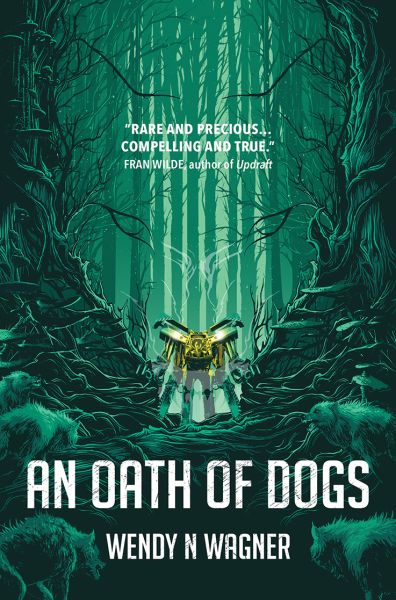Like Moses Before
An Oath of Dogs
By Wendy N. Wagner

31 Oct, 2017
2017’s An Oath of Dogs is a standalone SF novel by Wendy N. Wagner.
A near-fatal accident has left Kate Standish traumatized, paralyzed by acrophobia. Thanks to her therapeutic dog Hattie, Standish is able to function well enough to work again. Thanks to the selfless benevolence of the Songheuser company, she has a job wherein she can demonstrate her hard-won stability.
Poor Standish.
Standish wakes to discover that in the year it took her to travel in cold sleep from Earth to the life-bearing moon Huginn, she has been promoted. The man she was to have worked under, Duncan Chambers, has vanished into Huginn’s woods. That leaves Standish as Canaan Lake’s new communications manager.
Despite the familiar names hung on the autotrophs and heterotrophs native to Huginn, it’s a very alien planet and one that a century of occupation has not come close to fully exploring. In part this is because it is all to easy for unwary explorers to fail afoul of the local hazards and in part it’s because Songheuser is the main source of funding. And Songheuser cares only about the bottom line. Lines of research that look like they will not be profitable are ignored. Research that undermines the company’s plans is actively discouraged.
Despite her best instincts, Standish is drawn into the mysteries of Canaan Lake. What really happened to Duncan Chambers? What was he working on before he vanished into the woods? If he was murdered, was it an expression of corporate policy … or could it have been locals unable to distinguish between ecologists and ecoterrorists? What dark history links the world’s original colonists, the agrarian Believers of the Word Made Flesh, and Songheuser?
Most importantly for Standish, what alien force controls the dogs near Canaan Lake?
~oOo~
I am unfamiliar with this author but I’d put money on her either being from or currently resident somewhere forested and damp. This is a temperate-rain-forest sort of book. Also, probably American. Not much hint of global demographics in this novel.
Huginn’s economy depends in large part on logging …
(Well, regardless of what the humans call them, the tree-like growths are not actually Terran trees, so it’s probably wrong to call this logging.)
That is, on harvesting the local horsetail autotrophs. All I can say is “space travel sure must be cheap for that to be viable” and “it’s not the most implausible economic set up I’ve seen in an SF novel.”
A good chunk of the plot is driven by the fact alien worlds are, well, alien. Any human hoping to make a life there cannot count on eating local lifeforms because the biochemistries are incompatible. In fact, the first colonists couldn’t even clear land and plant crops without also introducing a wealth of terrestrial commensals Earth’s farmers take for granted. It’s a situation that can amplify small errors into mass starvation and death.
In many ways this is a standard late-capitalism SF novel. Songheuser is exclusively focused on profit, its executives on promotion and prudential ass-covering. However, unlike all too many SFnal corporations, Songheuser is at least willing to try the carrot before the stick. The reason certain peccadilloes have not come to light is that Songheuser has been very generous towards those who are in a position to expose what’s going on. No need to browbeat people into keeping silent if you can convince them their economic well-being is better served with silence.
The obvious comparison is to the disco-era classic The Word for World is Forest. There are some parallels — both involve colonialism, both involve logging — but Wagner’s world is more alien than Le Guin’s Athshe. Terrans could at least talk to the Athsheans (not that they bothered, for the most part). Here there are no intelligent natives, just a complicated ecology into which the invasive Terran lifeforms must somehow fit or face calamity. Or fit and still face calamity. Settling alien worlds is hard.
The murder investigation is competently handled (by both the protagonist and the author). Which renders it all too likely, alas, that the author will migrate over to the far more lucrative mystery genre.
But what I liked best in the book was the treatment of alien ecology; I wish the story had focused even more on biology than on corporate plotting. There’s no point to setting stories on other worlds that are just carbon copies of Earth. Wagner seems to understand that.
An Oath of Dogs is available here (Amazon) and here (Chapters-Indigo).
